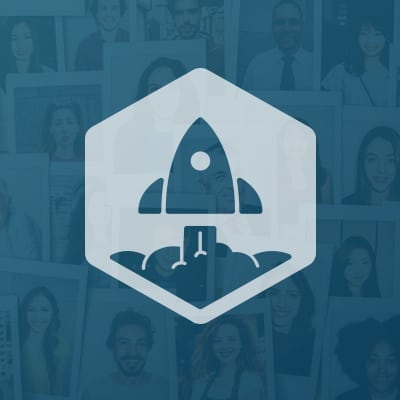As we gear up for SaaStr Europa 2023 in London on 6-7 June and SaaStr Annual 2023 in the SF Bay Area on 6-7 September, we wanted to take a look back at some of our most iconic speakers and sessions from over the year, that we can still learn from today.
Asana today has crossed $600,000,000 in ARR growing an enviable 34% with 115%+ NRR (135% from its bigger customers). But when CEO Dustin Moskovitz came to SaaStr Annual 2017, they were still leaving the scrappy stage at $60m in ARR and a primarily self-serve customer base … and deciding just how sales-driven they really wanted to be.
Dustin described it as “the late early adopted phase”, having just crossed 20,000 mostly self-serve customers.
Alex Konrad, Staff Writer at Forbes sat down with Dustin Moskovitz, CEO and co-founder at Asana and former co-founder of Facebook, to have an interesting conversation about what it means to be a mindful business.
“Startup culture, whether it’s in Silicon Valley or not, tends to lean heavily towards pulling all-nighters, running on coffee and lack of sleep, pretty much working yourself to the bone. Most, if not all, of us can relate to that, but is this really the best way to work? Dustin doesn’t think so. He shows us a different way to look at productivity by balancing periods of intense work and working at a more sustainable pace.
Announcer: Please welcome to the stage, Forbes writer, Alex Konrad and Asana CEO and Facebook co-founder, Dustin Moskovitz.
[applause]
Alex Konrad: Dustin Moskovitz, this is your life.
Dustin Moskovitz: [laughs]
Alex: It’s a pleasure to have Dustin here. Obviously co-founder and CEO of Asana, has done a few other things. Most notably, your foundation work which has been the last five years and then co founding Facebook, which people here probably heard of as well.
It’s a really awesome chance to talk about mindfulness and how it can create a better business. I thought it would be good to just give everyone an update if they’re not super familiar with what Asana does, where you guys are at in sort of your journey so far today.
Dustin: Absolutely. Hopefully that video gave you a taste. We really think about the SaaS collaboration market in terms of three big categories. First two, you guys are all really familiar with, files and document collaborations. That’s everything from Dropbox, G Suites, things like Quip.
The second category, messaging and communications, that’s Slack obviously, big deal this year. Things like Skype and enterprise social networks like Yammer. The third category is really our bread and butter. We call this work tracking.
All of these are really essential to having effective collaboration, but work tracking really helps get you clarity about what your team needs to do to get results.
It helps you answer the critical questions like, “What steps are left between now in accomplishing our next goal? Who’s responsible for each of those steps? When are they going to be done?” Really, any team in the world needs that clarity to be effective.
To give you an update on where we are. We just actually announced this morning that we’re up to 20,000 customers. We’re really excited about that. We’re also announcing two key new hires. We have Tim Wan, who is coming to us from Apigee. He’s our new head of global finance. We also have Oliver Jay coming to us from Dropbox. He’s our new head of global sales.
We’re really excited about having them here to help us really take the business to the next step.
If you think of Crossing the Chasm, we’re at the late early adopter stage. There’s still a massive market out there.
Alex: You’ve been doing Asana for a few years so far. Would you say you guys are at a hyper growth phase or an adolescent phase? Where would you put Asana in the overall arc of the company’s journey?
Dustin: Sure. We’re at a maturing phase, getting 20,000 customers. It’s a very stable real business. A lot of our growth is those individual customers continuing to expand and use the product more. There’s still a lot more to do. If you think of Crossing the Chasm, we’re at the late early adopter stage. There’s still a massive market out there.
I really think our market is all knowledge workers. There’s 500 million people around the world. Most of them don’t use any products in the work tracking category. There’s still a long way to go before everyone’s part of this new collaboration world.
Alex: Is this a company where you can be heads down and just work on improving the product one feature at a time or do you feel like you guys are in a high-stakes, more stressful race? What would be the atmosphere at you guys? As anyone who uses productivity software knows there are a lot of very smart people working in this broad category.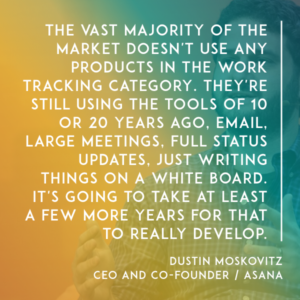
Dustin: It’s a little bit of both. You can’t really rest on your laurels. Again, the vast majority, the market doesn’t use anything. They’re still using the tools of 10 or 20 years ago, email, large meetings, full status updates, just writing things on a whiteboard. It’s going to take at least a few more years for that to really develop. We’re really focused on just executing the strategy that sets us up for success in the long run.
Alex: Another thing I’ve always find interesting is when I cover the company, it’s almost like in a lot of ways you and your co-founder Justin Rosenstein are interchangeable in terms of the buck stopping with you guys, but taking different focuses. I’m not sure how many companies here in the audience might have a dual leader structure. How do you guys make it work at Asana and how have you kept that going for well over five years at this point?
Dustin: We definitely complement each other’s skill sets a lot. I almost think of it even as a tram brake because we also have Chris Farinacci, who’s the head of business. Justin is very much focused on the product and the external communications.
We had an article in the Wall Street Journal this morning. He was the main person interviewing there. He’s very external focused and I’m much more focused on execution and helping the company. Helping make sure we have a great culture and a great environment. I’m so much more inward-focused, focused on things like process.
Between us and then with Chris running marketing, and sales, and customer operations, we’ve got everything well covered.
Alex: I’m curious. Has anyone checked the Glassdoor rating for Asana lately? Anyone, raise your hand. If you guys go look on Google before it gets changed now, they have a perfect score out of dozens of reviews. Dustin also has a perfect score as a leader, which is pretty phenomenal. You can really only go downhill from there. How’d you guys get there?
Dustin: [laughs]
Alex: How did I just screw it up?
Dustin: [laughs] Yeah. No, I am always worried about the sort of other shoe dropping there. [laughs] A lot of it is being really intentional about how we build the business and using mindfulness.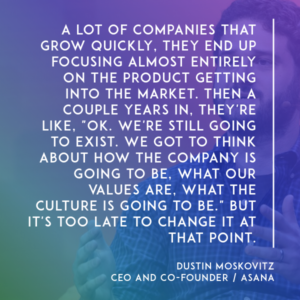
I like to say that a lot of companies that grow quickly, they end up focusing almost entirely on the product getting into the market. Then a couple years in, they’re like, “OK. We’re still going to exist. We got to think about how the company is going to be, what our values are, what the culture is going to be.”
It’s too late to change it at that point. Ben Horowitz likes to say that the book is basically sealed after 12 months. We thought we’d be around for a while. From the very beginning, we were intentional about how we built the culture.
We were reflective. When we saw things that needed improvement, we put our attention there, and iterated, and kept turning that crank until we had every part of the company running really well. The result is we have employees that are really engaged, happy, productive, and give us good ratings on Glassdoor.
Alex: Now, that was not the case with Facebook, though, early on, right? I don’t know if you guys have read this great blog post that Dustin wrote about a year and a half ago now, where he talked about the work life balance or lack thereof that you had in early days of Facebook.
I think you wrote that you were subsisting on soda and energy drinks for a while. Which I’m sure people in this room can understand, that happens. You said that it didn’t make you a more productive person to be grinding that hard or stressing that much. Can you talk a little bit about when you realized that, and what you would have maybe done differently today?
Dustin: A lot of it, I think, was how I was pushing myself and some bad habits that I formed early on. A lot of it, also, I think, is the culture of the tech industry. Especially Silicon Valley, where it’s romanticized to be working 24/7. You’ll hear people say they were up two nights in a row finishing this project, things like that.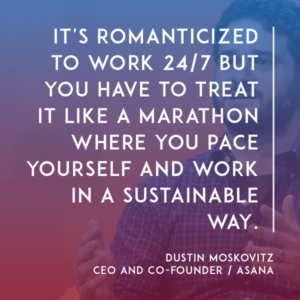
It’s easy to get this idea that that’s the optimal way to work. That’s the way to get the most done. When you talk to people that are further in their career, if you look at any of the research that’s been done about this, you get the exact opposite conclusion. Where you have to treat it much more like a marathon and really pace yourself, and work in a sustainable way.
I started Facebook when I was 19. You can do that for a couple years, especially when you’re young. Eventually, you’re going to burnout. Eventually, you’re going to slow down. A few years in, I was starting to feel that. It was starting to cost me.
The blog post I wrote is Work Hard, Live Well. It’s on Medium. I talk about better patterns for how to build sustainable habits. It’s at every scale of abstraction. You have to take breaks during the day. You have to go home and rest at night and unplug. You have to use your weekends. You have to take vacations.
After a few years, ideally you can take some time off between jobs, or take a sabbatical. That’s the way to keep going. A lot of the people that I’ve seen in start ups or coming from Facebook, they didn’t learn these lessons. They burnt out. Frankly, some of them stopped working for years at a time, or retired early. You have to be intentional to avoid that outcome.
Alex: When people defend hackathons or institute sprints, I often hear the argument, in their defense, that it’s a way to forge a culture really fast, or create a bonding experience for everyone to suffer through where they come out more tight knit. Maybe they have a good idea, maybe not, but it’s a shared experience there.
Do you think there’s any value there that you lose if you don’t do that? What would be the alternative to maybe these kind of trial by fire type scenarios?
Dustin: You can still do those things for some period of time. If we’re going up to a big launch, yeah, we’ll sprint and people will work harder than normal. The key then is to, after you get to that launch, actually rest after.
For our hackathons, we’ve been pretty thoughtful about this. Yeah, the younger employees at Asana, they want to stay up all night and do that. Once a year, we’ll try and have a hackathon that’s more oriented around that.
Other times during the year, we’ll have a hackathon that takes place during the day, or maybe across multiple days, to give people a chance to participate in that creative process who can’t necessarily stay up all night, maybe they have a family, or maybe they [laughs] get tired at night, and so creating that environment for multiple people.
It’s not an either or thing for me. You can still have those intense experiences where you bond, but they shouldn’t be the norm.
Alex: I, for example, have FOMO so bad with checking Twitter, that I had to download an app that literally makes me take deep breaths before I can open Twitter.
Dustin: Great.
Alex: That’s how often I check it during the day. It makes me breathe more the more the more times I’ve opened it.
I have no self control. How do you embrace people being excited to be at Asana, being excited to be working on these projects, but also needing maybe for their own health to step away more than they might expect to?
Dustin: You don’t want to get into somebody’s way. If they’re really excited, again, for a couple of weeks at a time or a couple of nights in a row, you can work like that. If you see somebody doing it just day in, day out, they don’t seem to have a life outside of work, we’ll talk to them about it.
That’s really on their manager and on their peers to say, “Hey, are you sure you’re taking care of yourself? Are you sure you’re doing this in a sustainable way?” and also building habits into the company.
We do orient our engineering teams around sprints, but in between, we do off sprints. Sprints for us are really also just about focus, where you have fewer meetings, fewer other activities, but there are also a period of little more intense work.
Alex: Hold on. I’m probably the least technical person in this room, so you have to bear with me. Can you explain a little more what an off sprint would be?
Dustin: An off sprint would be catching up on other things. A lot of people at Asana, they have their primary responsibility with an engineering program. Then they have other areas of responsibility, which may be cultural things like values or hackathons or something like that.
An off sprint would be a time when you put more intention on that. Maybe go back and fix some bugs that you created in your last sprint. Fill out some interview feedback you forgot to do. Just catch up on things and reset your patterns and also reflect on how the prior sprint went, and plan the upcoming one.
Alex: Now is the willingness to have a healthy approach to building software to going on this long haul approach, is that something you have to vet for in the hiring process, or is it something that people can pick up and reform when they arrive at Asana?
Dustin: It’s a little of both. I would say that people actually self select for Asana in a lot of ways. If they have this kind of personality, where they’re naturally into mindfulness, they’ll see that Asana represents that and would want to work there.
I also see people who realized they’ve been burned out and have had bad patterns. They want to learn good habits. They’ll look to Asana as a place where they can learn those skills.
Once they get there, we literally train people on mindfulness. We have processes and patterns that make that the natural way to behave there.
Alex: Do you guys have the same perks and catered meals that a lot of companies offer in Silicon Valley? Because we always hear the debate if you’re serving dinner at 8:00 or 8:30, isn’t that just encouraging everyone to stay late? Is it a perk, or is it a golden handcuff that’s keeping people there? [laughs] Where do you guys come down on that balance?
Dustin: We want to have a great environment. Again, it’s in service of optimal productivity. If you’re keeping people until 8:30 or 9:00, yeah, I would argue that’s actually shooting yourself in the foot, even though you’re getting more face time. I got to assume that those hours, 7:00 to 10:00 PM, just aren’t as productive as the ones at the beginning of the day.
We do serve dinner. We serve it at 6:30. There’s actually a long line right now. I imagine over time, we’ll shift that in a little earlier. That’s just a compromise position. Maybe about a third of the company actually stays for dinner. Other people are going home before that. That’s totally culturally OK.
Alex: Some of the feedback I saw on your blog post that resonated with me was actually a response that I wasn’t expecting about how this could actually combat ageism in Silicon Valley and actually encourage people with families, people who have been in the game for a long time, to actually stay at a high growth company like Asana, because they can actually think of a work life balance, as opposed to skewing just to young coders with no kids to go home to.
Do you see this ageism issue in other companies? What do you think is the response there?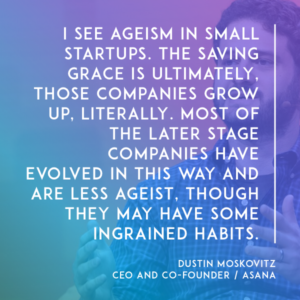
Dustin: I absolutely see that at small startups. The saving grace is ultimately, those companies grow up, literally. The people who started at Facebook, they’re now in their 30s. They have kids. Mark has a daughter. They need to conform the culture to make that possible.
Most of the later stage companies I do think have evolved in this way and are less ageist, though they may have some ingrained habits. The startups, particularly when they’re started by people in college, they tend to think like, “Oh, this is just what makes a good startup. Everyone else just has to deal with it.” It ends up having these byproducts.
Alex: I guarantee you that there’s going to be large number of people here who are nodding along to everything you say and will go back to work tomorrow or Friday and work a 14-hour day. It’s so much harder to practice these goals.
Do you have any first steps or very high level fixes that people can actually think about implementing first to maybe move towards that culture that you have?
Dustin: It’s tough. I imagine a lot of people here are the leaders of their company. I would just make sure that you’re aware that the best fix is just going to be you acting differently. Most of the other people in your company are going to be at the effect of the tone that you’re setting.
Just make sure you understand you bear that responsibility. [laughs] You can also just maybe, tomorrow on Friday, just imagine me on your shoulder, just shaking my head if you’re still there too late.
[laughter]
Dustin: The easiest thing to do is also just the small scale taking breaks during the day. Some Asanas use the Pomodoro method. Literally, we have a timer. There’s also apps like yours for the phone that remind you, “Hey, take a breath. Pause.”
There’s an employee at Asana that has something like that actually on his desktop. Every 50 or 60 minutes, it actually takes over the screen. It’s like, “Alright, chill out. Take a breath.” That is the easiest thing to do.
Then building on going home on a reasonable hour, taking your weekends. There are some great tools for that, just turning off notifications. Slack has a great active hours feature for this.
Just really taking advantage of those things and being intentional about it, so you don’t fall into these habits of, “Oh, I got a push notification. I got to respond to that right now.”
Alex: From what you’ve said in the past, it seems like you were facing some burnout at Facebook by the end. Now, you’ve said that you take a day off, go for a hike, or unplug if you sense the burnout coming back. What are the warning signs that you notice when you think, “Uh oh, I’m starting to get manic,” or, “The old Dustin is coming out?”
Dustin: Yeah, the old Dustin.
[laughter]
Dustin: For one thing, I get more irritable and not as great in interpersonal conversations with people. They’ll reflect that back at me. I’m pretty self aware about it at this point. Also, I’m just not productive.
It’s like when you’re sitting at your desk and you’re staying late because there’s still work to do, but you’re not actually getting it done. That means you’re burned out. It’s a lot more productive to say, “Hey, I need to actually unplug. I need a rest. Then I’ll come back and do this in a much more time efficient way.”
Alex: Now, another side of mindful business is also having interests where you can make an impact that are maybe aligned with the philosophy of the company but are outside the company. You guys gave a lot of money through your foundation to a bunch of causes last year. Are we allowed to say how much you gave?
Dustin: Sure. Do you know, or do you…
Alex: Yeah. I think you told me it was $100 million, all told.
Dustin: I think we actually gave about $200 million last year.
Alex: He downplayed it, then.
Dustin: Yeah. [laughs]
Alex: $200 million.
[applause]
Alex: Yeah. Let’s get a round of applause. How did that become a focus for you? I’m curious how does being involved in causes that matters to you maybe helped you stay grounded as also a CEO.
Dustin: Sure. How it became a focus…I guess it just almost felt like a compulsion or a moral responsibility. I came into a lot of capital very, very early in life, and a lot of people in the tech industry think, “I’ll spend my career accumulating capital. I’ll give it away at the end.”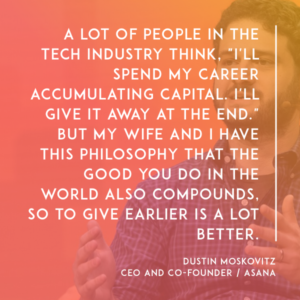
But we have this philosophy, my wife and I, Cari, that the good you do in the world also compounds, so to give earlier is a lot better. I also have a philosophy that the world will be better 20 or 30 years from now, so in some sense the opportunities will be worse for giving.
We thought about, “Maybe we should start early, and if we’re going to start early, how should we do it?” and ended up finding the GiveWell team.
I don’t know if people are familiar with GiveWell, but they’re effective altruists. They start from this premise that you should try and make every dollar count, so you want to be able to donate every dollar in the most leveraged way possible.
That means looking for categories and also nonprofits that are cost effective and leveraged, they’re working on tractable problems, and they also have a funding gap, so it’s the ones that don’t already have a lot of attention.
That’s when we’ve been able to develop some really great areas so far. Just to give you some broad strokes on that, the three big categories, one is Global Health and Development. That’s GiveWell’s bread and butter.
We also have a new organization, the Open Philanthropy Project. They’re a little different from GiveWell in that it’s less proven cost effective and more probabilistically cost effective, so you’re willing to take risks.
The two big areas we’re working on there, one is Global Catastrophic Risks. Subfocuses there are Biosecurity and Preventing Pandemics, and also Risks from Advanced Artificial Intelligence.
Then the third area, which is really relevant to what’s happening in the news right now is, we work on US public policy. We’ve had a program for a couple of years and now working on immigration. Obviously, that’s very relevant.
[applause]
Dustin: Thank you. [laughs] Also working on criminal justice reform is actually, probably, our largest program. That hasn’t been in the news lately, but if Sessions gets confirmed next week or later this week, then it will become a big deal.
Alex: Yeah. Asana was one of the tech companies that signed an amicus brief supporting the state of Washington against Trump’s executive order on immigration.
It seems like you have certainly positioned the company to be a voice for the tech community. Is this something that your employees are calling for? It this something that as a CEO you guys are setting this culture for the company? How do you end up in this position as one of the leaders in opposing a policy that might have moral or business or both ramifications?
Dustin: Sure. I think it’s a little of both. Certainly Justin and I and Chris are just very quick to want to respond to these things, so, when something happens, we’re almost immediately discussing what we should do.
But, yeah, our employees at this point just expect it, and if we go more than 24 hours without saying something, they’re going to start to ping us. Also, just to point out we’re in really good and numerous company on the the brief that you discussed. There were 97 companies that joined.
A little bit of background there. The deadline was actually pulled in and it became a fire drill on Sunday, but there’s another 100 or more companies that were meant to join and maybe will join later.
Almost any company I could think of was in this giant list of everyone they had collaborating on it, so I think it just seems like a consensus viewpoint at this point.
Alex: You give tens of millions to causes that might be related to the current political climate. You also as CEO have a great platform to speak out.
For people who maybe don’t have the personal wealth to give on that side, how would you recommend they leverage what networks they have or what impact to make a difference more on that second side?
Dustin: I think this is something we’re all still collectively figuring out, but the things that immediately come to mind are certainly just being active, paying attention to what’s happening in the news.
I think there’s an instinct for a lot of people to just turn away, because it’s very upsetting, but being educated, I think, is a big deal. Also, just talking to the people in your networks that they may feel differently, including some hard conversations with family.
Then actually engaging with the political apparatus. I think we’ve got a lot of evidence that calling your congresspeople is really effective, particularly if you live in rather purple districts.
I know people are here from all over the country and all over the world, but they respond to that. They want to hear from you. I think that the pressure that the public is putting on the politicians is really helping.
Alex: I do feel like for some tech companies, especially ones that are even smaller than Asana, it’s hard to figure out how much you want to watch the political climate, and maybe get distracted or just depressed and not feel like you can do that much, versus keep your head down and focus on creating jobs that way and just doing your company’s business.
I’m curious if you feel like it’s something where there’s a certain scale where it does make sense to be active or if you would say it’s healthy for any company to be watching the news or trying to join a brief where maybe they don’t get called right away because they’re a smaller startup.
Dustin: Again, I think on this brief there were startups of all sizes and larger companies too. I think that’s a question that everybody has to ask themselves, but there’s no bright line for me where you’re too small to matter.
Particularly when you’re thinking about these larger protests or engaging with politicians, the numbers matter. Every voice counts, just like in voting.
Alex: I feel like we also need to ask about diversity and how a mindful business approaches including more underrepresented groups within your employees, within the customers you meet with, and basically just tackling that issue as another one that maybe people sometimes want to shy away from or wait for someone else to lead on.
Dustin: Yeah. Partly because it’s just that it’s really hard, [laughs] and there’s a lot of things that require energy and attention in a growing company.
But, like I said earlier, a lot of the rulebook of how our culture works is cemented in stone early on. A lot of our attitude about it is just, if you start early, it will be a lot easier later on.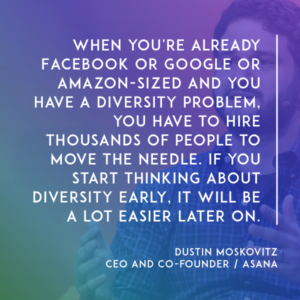
When you’re starting and you’re already Facebook or Google or Amazon-sized, and you say you have a diversity problem, you have to hire thousands of people to move the needle.
I think one of the things that’s the clearest about diversity is, people from underrepresented groups want to work at a place that already has people like them. They don’t want to be the first person in the door of representing that group.
So, if you just make a little bit of progress, again, that’s something that all compounds and, build over time, they’ll help teach you about your biases and help you fix your processes and become more mindful about it.
Then, of course, there are just proactive things you can do, like unconscious bias training, thinking about your interview processes and how to set candidates up for success.
Again, a lot of that is just the hard work. I highly recommend having a person who’s fully focused on that. We have a head of D&I, Sonja, and she’s just been able to make a lot of progress in a short amount of time.
Alex: You still do one on ones with a lot of employees on a somewhat regular structure, right, to get a sense of what people are thinking at even any level?
Dustin: Sure. Yeah. I only have recurring set one on ones with a few people, but I also just sit down at lunch and breakfast every day and talk to people there, just trying to make myself available.
Alex: Can we get one more round of applause for Dustin?
[applause]
Alex: Thank you.

